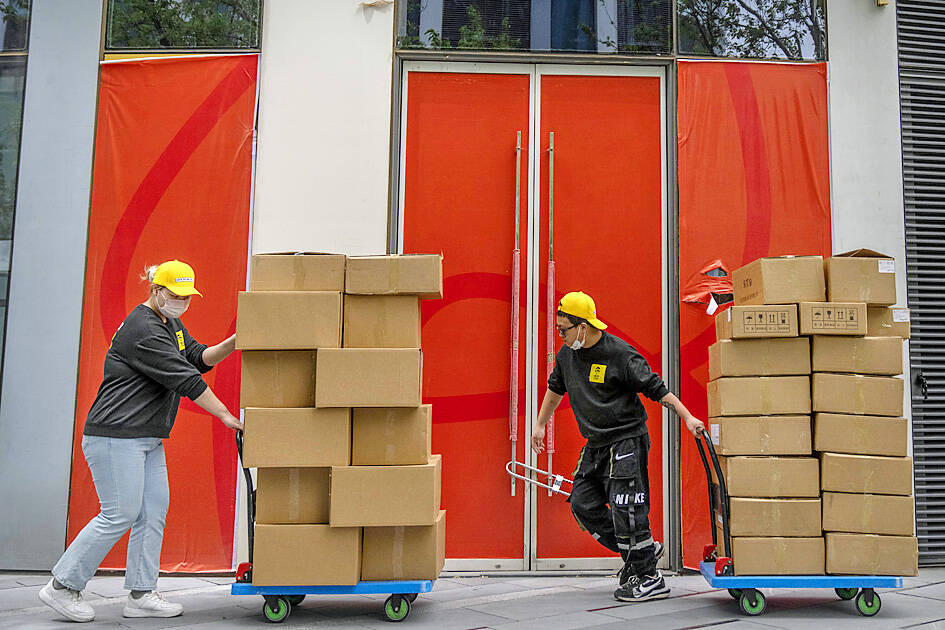Italy’s exports to China have tripled in little more than a year. The problem is, even the experts are struggling to explain why.
Shipments abroad rose above 3 billion euros (US$3.3 billion) in February, up 131 percent from a year earlier. This follows another jump of 137 percent the month before.
For comparison, Italy exported about 1 billion euros of goods and services in January last year to the world’s No. 2 economy.

Photo: AP
Such a boom would be hard to explain under normal circumstances. Now, as Russia’s war in Ukraine and supply-chain upheaval distorts traditional trade flows, it is downright mysterious.
First, consider the politics. Italy might be the only G7 country that has signed up to China’s mammoth investment plan, the Belt and Road Initiative, but the economic benefits of such an alliance since 2019 have been limited.
Moreover, relations had already cooled significantly under former Italian prime minister Mario Draghi. His successor, Giorgia Meloni, has signaled to US officials that she would pull out of the controversial China deal before the end of the year.
What makes the data even more puzzling is that it is all down to a specific sector: pharmaceuticals. To be more precise, “medicaments consisting of mixed or unmixed products for therapeutic or prophylactic uses, put up in measured doses.”
Exports of this group of products rose to 1.84 billion euros in February from 98.5 million euros a year earlier. They accounted for almost two-thirds of all Italian exports to China.
Why the spike? Italian media have speculated that the driving force is runaway Chinese demand for ursodeoxycholic acid (UDCA), a chemical used mostly in liver drugs and that has been claimed — without reason — to help prevent COVID-19.
So the sudden end of China’s “zero COVID” strategy and the subsequent wildfire spread of the virus across the country might be behind the export boom, although the vast majority of China’s population appears to have gotten COVID-19 in December last year and January, meaning they would have recovered before Italian exports started rising.
However, UDCA demand alone does not explain the export peak.
Industria Chimica Emiliana Srl, the Italian company that is the world’s largest integrated producer of UDCA and bile acid products, has yearly sales of about 300 million euros, just a fraction of the jump in Italian pharma exports to China.
Adding to the uncertainty, the most recent Chinese data yields little evidence these products are arriving en masse. Considering shipping times, the drugs — whatever kind they are — should have made it to China to be counted in last month’s trade data, but there was no observable change.
One explanation might be shifting regional trade.
“It’s likely demand for medicines from China,” said Peter Ceretti, a director at Eurasia Group who investigated the matter. “Larger Italian pharma producers are shipping as much Italian-made product as they can, and perhaps some are moving German and other European Union-produced medicine into Italy for re-export to China, too.”

The Eurovision Song Contest has seen a surge in punter interest at the bookmakers, becoming a major betting event, experts said ahead of last night’s giant glamfest in Basel. “Eurovision has quietly become one of the biggest betting events of the year,” said Tomi Huttunen, senior manager of the Online Computer Finland (OCS) betting and casino platform. Betting sites have long been used to gauge which way voters might be leaning ahead of the world’s biggest televised live music event. However, bookmakers highlight a huge increase in engagement in recent years — and this year in particular. “We’ve already passed 2023’s total activity and

Nvidia Corp CEO Jensen Huang (黃仁勳) today announced that his company has selected "Beitou Shilin" in Taipei for its new Taiwan office, called Nvidia Constellation, putting an end to months of speculation. Industry sources have said that the tech giant has been eyeing the Beitou Shilin Science Park as the site of its new overseas headquarters, and speculated that the new headquarters would be built on two plots of land designated as "T17" and "T18," which span 3.89 hectares in the park. "I think it's time for us to reveal one of the largest products we've ever built," Huang said near the

China yesterday announced anti-dumping duties as high as 74.9 percent on imports of polyoxymethylene (POM) copolymers, a type of engineering plastic, from Taiwan, the US, the EU and Japan. The Chinese Ministry of Commerce’s findings conclude a probe launched in May last year, shortly after the US sharply increased tariffs on Chinese electric vehicles, computer chips and other imports. POM copolymers can partially replace metals such as copper and zinc, and have various applications, including in auto parts, electronics and medical equipment, the Chinese ministry has said. In January, it said initial investigations had determined that dumping was taking place, and implemented preliminary

Intel Corp yesterday reinforced its determination to strengthen its partnerships with Taiwan’s ecosystem partners including original-electronic-manufacturing (OEM) companies such as Hon Hai Precision Industry Co (鴻海精密) and chipmaker United Microelectronics Corp (UMC, 聯電). “Tonight marks a new beginning. We renew our new partnership with Taiwan ecosystem,” Intel new chief executive officer Tan Lip-bu (陳立武) said at a dinner with representatives from the company’s local partners, celebrating the 40th anniversary of the US chip giant’s presence in Taiwan. Tan took the reins at Intel six weeks ago aiming to reform the chipmaker and revive its past glory. This is the first time Tan